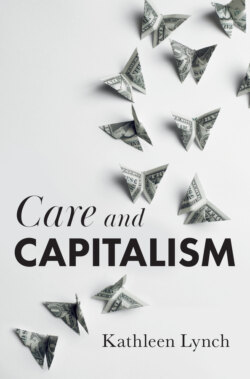Читать книгу Care and Capitalism - Kathleen Lynch - Страница 24
Ideological matters
ОглавлениеNeoliberal capitalism has many disorders and contradictions undermining it internally (Streeck 2016; Jessop 2019); however, it also has many powerful ideological tools at its disposal to perpetuate disorder in its own interests. One of its defining features is its ability to conflate economic, moral and political understandings (Harvey 2005) so that what was once regarded as ethically reprehensible is now regarded as normal. Neoliberal capitalism has encoded the pursuit of profit at all costs as an exciting individual choice, a moral purpose governed by meritocratic principles, and a system that guarantees personal security for those who are worthy (Boltanski and Chiapello 2005).
As Weber (1930) and, more recently, Boltanksi and Chiapello (2005) argued, people need powerful moral reasons for rallying to capitalism. What gives neoliberal capitalism much political credibility is that it has managed to colonize public discourses on morality in a way that makes winner-takes-all profit-making virtuous. In lieu of solidarity, globalized capitalism offers unique forms of excitement and liberation (especially from the local) and opportunities to realize personal ambitions. The enticement and excitement of capitalism culturally are that it offers choices, especially in consumption terms. Even if such choices are between equally valueless goods, choice symbolizes that one has access to the power and autonomy that the market offers. The poor and not-so-poor are incorporated into society via credit and indebtedness, while ideologies of consumer power, consumer protection and consumer goods create the illusion of power and sovereignty (Soederberg 2014).
Neoliberal capitalism also lays claim to servicing social justice and the common good by rewarding the meritorious, the ‘intelligent and hardworking’. To be a winner is to be entrepreneurial in a self-interested way. Winning is framed not only as virtue, a social good, but also as a game that simultaneously offers adventure and excitement without human cost. An actuarial spirit of calculation is normalized for all classes in a way that was unthinkable a generation or two ago (Peters 2005). For those who ‘fail’ in the merit stakes it offers charity. While charity long predates capitalism, contemporary philanthrocapitalists have framed it in a new corporate form as a politically appropriate method of redistribution; they regulate charitable ‘giving’ on their own terms in a highly strategic and business-like manner, a giving that reinforces rather than challenges the injustices of capitalism (Giridharadas 2019). Yet their charity provides them with a valorized public persona and a sense of pride in their own generosity, no matter how unwarranted that may be (Browne 2013).
Security is a prize also available to those who behave responsibly, and who are active in managing themselves and availing themselves of opportunities within neoliberal capitalism. ‘Moral’ people are those who secure their futures by regular reinvention, mentoring and retraining. They also manage their privileges responsibly by securing their transfer intergenerationally via property, including cultural capital, the management of education and money, and social networking. Solidarity with the more vulnerable is replaced by the ethic of self-responsibilization, especially among the middle classes, as they fear the loss of class standing in increasingly precarious work and welfare regimes (Mau 2015). Solidarity has become more and more conditional on self-responsibilization (Paskov and Dewilde 2012; Frericks 2014).
Unlike the early years of organized, European-led, colonial capitalism, when powerful oligarchs and monarchs sought moral approval prospectively and often retrospectively from their marauding and murdering in the acquisition of wealth (Patel and Moore 2018), the accumulation of wealth is now a universally approved precept for the labourer as well as for the venture capitalist. Not to follow this precept is to be deemed foolish and irresponsible. It is the universalization of self-interest as virtue, and the related distancing and invisibilization of harm, that make neoliberal capitalism particularly care-less.
